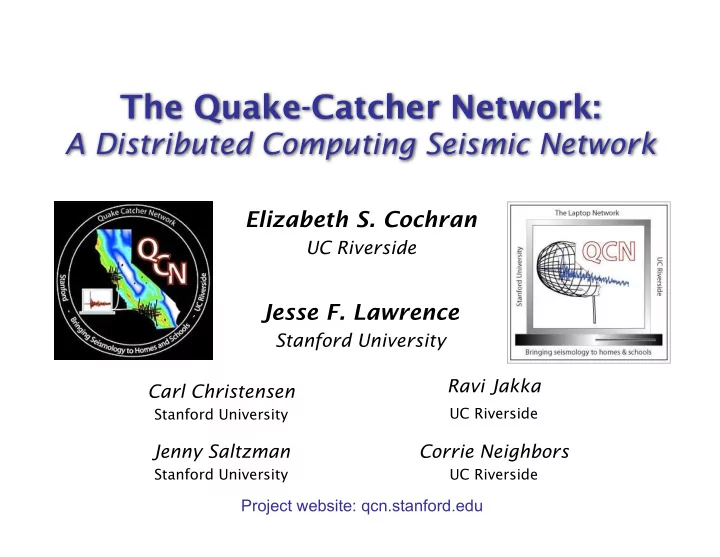

The Quake-Catcher Network: A Distributed Computing Seismic Network Elizabeth S. Cochran UC Riverside Jesse F. Lawrence Stanford University Ravi Jakka Carl Christensen UC Riverside Stanford University Jenny Saltzman Corrie Neighbors Stanford University UC Riverside Project website: qcn.stanford.edu
The Quake-Catcher Network • The Goal: To network computers with internal or USB- connected accelerometers for rapid earthquake detection. • The Method: We use distributed computing to monitor sensors internal or connected to computers when they are not otherwise being used.
Distributed vs. Parallel Computing Parallel Computing: Distributed Computing:
Demo - Laptop Accelerometer
Challenges: Noise: Man-Made Location: always changing Timing: NTP
Earthquake Detection • Probable earthquake detection when the QCN receives many triggers from a region • Otherwise just people bumping their laptops • For big earthquakes: – only strong vibrations will be detected – Only large earthquakes will cause consistent triggers across a region of the network
Current Network Global Participants Earthquake Locations
USB sensors at San Jacinto High School Los Angeles Participants
Reno Earthquakes Captured!
LA/Chino Earthquake Captured!
Desktop Network USB Sensors Available! • With a USB sensor, any $5 for teachers computer can be turned into a strong motion seismometer with QCN software – Schools can use the software to educate students about earthquake & seismology – School sensors can be distributed evenly with population Subset of K-12 schools in LA Basin
Educational Outreach What we provide: – Classroom Demo software. – Seismology related in-class activities. – Classroom USB Sensor. Request Sensors at: – Classroom BOINC Software. qcn.stanford.edu
Science Benefit • Shake Maps • Buildings • Rupture • Structure
Eventual Goal: Earthquake Early Warning M 5.6 (October 30, 2007) M 7.2 (August 16, 2005) Alum Rock, California Honshu, Japan
Conclusions • Distributed computing could be a hugely beneficial to seismology & other data-centered fields – Rapid earthquake detection techniques – Monitor all types of sensors, easily scalable • Potential for Earthquake Early Warning Application! • Great education and outreach opportunities! More information @ http://qcn.stanford.edu
Recommend
More recommend